- Home
- Adam Thorpe
Voluntary Page 2
Voluntary Read online
Page 2
outflung behind us and before. I ought
to have been visiting your house in Maine
but for toxic luck’s voracity; instead,
my little pilgrimage has ended
in this: a New York roar of indifference
beyond the disbelief. You cherished
one another more than any couple
I have ever known; would
have smiled to see me here … just like
your novel, stopped mid-stream.
Still struggling to imagine the rest, no
second thoughts and the keys stuck.
IN THE PARK AGAIN
Nature’s judged it nicely
with that girl on the bench, who’s spoilt it all
with a wahoo copain
and a languid swell of bubble-gum
developing at her mouth like a medical illustration
as she consults her iPhone.
Before her, where the park’s
small lake eructates the source even in drought,
they found a Roman capital
covered in vulva, like cleft peaches.
No, more labial than peaches;
though fashioned from marble
with a crude chisel, they convey
the thing itself, shaven
as close as a classical underarm
and repeated all round, over and over.
It’s not on display, for the sake I suppose
of school groups, though a teacher could imply
it was fruit, a tree’s-worth of apricots
or figs fissuring after a summer squall.
Now in the depths of the pittosporum
there are trysts that serve a variety of tastes;
while the stone statues of the ancien régime
reprieved by limewash and gazing
out from their locked-in time
of gods and nymphs and scanty chemises
look harmless enough, standing about like men
too old to be wrong. I find some grass at last
that’s clear of dogs’ laxation or broken glass
and read about the Revolution; how afraid
foppish Robespierre was of others’ flesh.
WRITER
Nervily perfectionist, he cracks
syllables and removes words
as once he reduced daddy-long-legs
to their vernacular of trunk
as a secret favour to his grandmother,
who had to flap her hands
otherwise, reading in the deckchair
on the summer lawn. Did she wonder,
perhaps, why at eight years old
her grandson was still crawling around
with his nose so close to the ground
on such a gorgeous day?
HOLBEIN
Tate Britain
‘Once I was alone with a Leonardo …’
The crowd thickens, stands in rows
three-deep, as if waiting for a train.
This is great art’s business end:
the traffic of eyes in our passing glances
makes meaning manifest
in what, you agree, would otherwise
stay merely unique – straddling lifetimes
with the ease of the chosen, set
behind glass like a saint’s relic.
Though there’s something flirtatious
about these slow-moving rooms, hushed
like a church, where certain faces
become almost familiar and unlike the art
will pass out of our lives for good:
that willowy girl with slight vitiligo,
the loud hipster with his lateral thoughts.
And good’s the word; here war
is an anomaly, greed perverse:
the invisible brushwork is its own heaven.
The young appraise and cannot imagine
the world existing without themselves in it;
while the old know, under their county
shocks of white hair, that it will (without them)
do quite well. They’ve got off lightly, after all,
to be stood here still, squeaking the floorboards
on their well-to-do heels, vituperative
or cast in wonder while there’s time to be so.
UNDERGROUND
In the crypt of St Gilles du Gard
my wife sings, with a dozen others,
la Messe de Nostre Dame by Guillaume de Machaut.
It is damp and cold; a candle ungathers
its flame in a draught. The murdered papal legate
is laid along the cloister, under a pockmarked
slab, where even in drought
there is always water. Bad stuff
starts from a single point in time.
Near the well where, in 1562,
the priest and his choir boys were dropped
through its webs, Gilles the hermit’s tomb
lies rough and thick, as if shaped by a mallet.
To touch it, the pilgrims would come in vast
numbers, all sweat and clamour, scattering
the mast and straw of nights on the road.
Was it all in vain? Nothing improved,
the age not turning over a new leaf,
death still setting its milestones
of war and plague. The Front National
runs this town and her peeling, piss-smelling
streets are sinister. Now the Kyrie
rises in overlapping petals of full-voiced tones
to break and shower us from the vaulted ceiling
or dim into the distance of tombs and stone –
the beauty and the bleakness so beguiling together,
like faith; like the government of faith by grief.
SECOND HOMERS
No, not Jones’s ‘weathered mantle-rock’
but the tussocked drystone of a terrace wall,
unbrowbeaten by frost, mossed through centuries,
toffee-hammered in minutes as I watched
the backhoe digger at work next door.
The past’s luggage lost, the new destination
an intestinal circuit-board of pipes and wires:
the rough surgery of the Normans’ pool.
Out with the chick-peas, onions, leaks,
the few rows of vines for the style.
Three weeks of sunburnt mirth a year
just where each spring we’d hear the nightingale.
VIA
As in a dewy meadow lit by dawn
at least the conquered could see
(in cobbled mortar or beaten earth)
the threads by which Rome spun control
and held her sway: the stout bridges tackling
the floods’ shout on sharpened piers;
the milestones’ clipped precision; or the inns
of fare where grooms rubbed down the frothed
horses, still shivering from the effort
it took to measure even the Empire’s thumb.
It was clear, the oppression; its dust
settling on your tongue: that heft, that strength.
Those wheels, those hooves, those feet. There was no secret
to it. The central point was a pillar of stone
in the Roman forum – about which everything
revolved and back to which everything
came as the suspended ball in a game
of skittles rests from its swing: a needle of stone,
a node, something to kick at, not the end of the road
but the beginning, the start, the journey controlled
as a finger alters the flight of a kite on its long,
invisible string, twitched from afar to be turned.
Mounted, with baggage and arms, an officer
could make ten miles by dusk; a Brit, to get
to Rome, would need a good six weeks
of a nerve steadier than murrain, bandits, mud.
Distance was u
nderstood: and how it controlled.
Now what keeps us checked is far less clear.
All roads lead to Riyadh, yes, but the ways
are of air and you will never walk them,
they won’t climb the slope in hairpin swags
or vanish into the arch of a gate. Only
the powerful use them, their wallets full of wars –
undertakers pacing before the coffined future
they have, with such infinite fuss, prepared.
INTERIOR WITH A YOUNG MAN READING
after the painting by Vilhelm Hammershøi, 1898
Only pretending to be alone, of course,
leaning wanly in the unseen window’s
northern light: knuckles as shiny as his black shoes
or the ebony wedge of desk ensnared
by the chair’s back, its creamy fan of bars
as thin as his fingers against the dark book
whose words will not come right. His mouth’s
got its draw-string concentrated look,
as if there’s nobody here to impress.
It is bright out: the broad pine boards either tick
with heat or are chilled under snow-light
(the season remains unclear). And Vilhelm, of course –
insisting the shoes be polished over and over,
the scrubbed hands be helped with lanoline
to useful highlights – now keeps muttering,
through the slap of brushwork, ‘No posing, no posing!
You are quite alone!’ His brother’s the genius;
he will be forgotten. Will the book’s
thin wings take flight? Will the paint
be wet forever, the unknown life
always ahead of him and perhaps shorter
than the oyster light might lead one to expect?
Only the clock’s quarterly clearing of its throat
reminds him, from time to time, to ask permission;
to flex his limbs from cramp and take a step.
ALCALÁ
11/3/2004: in memoriam
The guide book unread, it was a shock –
opening the hotel’s curtains
with their snared litmus of smoke
to a dazzling installation of storks’
whitenesses, the wings half-snuffed to black
and spread in supernumerary arches
among the belfry’s own, or gliding
low over the shocks of nest
that history’s stony strictures had left alone.
Then the bombs flashed some four years
further down the line. Odd, how the bells’
tolling felt already as familiar
as the incumbent storks that
‘always come back’, you said.
As if returning was a wonder.
VESSEL
Saaremaa, Estonia
This rowboat’s taken root and bloomed
its crew: a clinker-sided, wild-flower trough
in stonewashed blue by the corrugated shed
on an island whose vowels are the way
this inlet’s waters arrive through the plumed
reeds – in a flat calm, lighter than the sky’s grey,
on whiffs of bog-tar. The flowers are mostly red,
with a clutch of yellow comfrey bowed
over the sky-washed oar-bench. Was this designed,
so perfect in its fashion (that immaculate curve
of the gunwale up to the prow), the wreck allowed
its resurrection? Or has it simply remained,
untended, the rest down to the same verve
we’ve fought to master as if it had a mind:
the rotting hull a compost, and steerage feigned.
SUMMING UP
Each week he comes to the Home and entertains
the more ‘able’ residents (on voice and guitar)
in the so-called communal room at the far
end of the corridor, so the popular strains
of love’s classics (‘This being St Valentine’s,’
the nurse laughs, hooking back the door
I’d firmly closed) now add the proverbial straw
to the pyre of loss. As your life grinds
to a halt (but not yet, not quite), You Are
the Sunshine of My Life crackles to a start.
He has a portable amp and a bigger heart,
does it all for free. I was hoping for
some last-words summing-up, a clap of thunder,
not songs that beat my finger against your palm:
the choric sorrows usurped by Andy’s charm,
the cygnet’s lament transfigured to Stevie Wonder.
CLEARING YOUR STUDY
1
Private realm of accounts, typed letters;
a book of unused Green Shield stamps;
meticulous inventories of minor expense;
bills and photos I pause under the lamp
to study, though (like a thief) I am short of time.
I am only doing this at your behest, of course –
the house must be cleared before it’s sold –
but as I keep vigil in the nursing home
I feel I’m untying what keeps you fettered
or dismantling something that has grown too old,
foraging backwards as you weaken, get worse,
to the earliest generation of your Pan Am pens.
2
Or finishing you, perhaps. In the sleepless nights
I hold your hand and wish to be forgiven,
your breathing the moan of wind in sedge,
coming and going. (The Home murmurs
as nocturnal woods do, bustling with rumours.)
The muddle kept at bay, avoiding the edge,
your entire life has been tightly guyed
by the kind of order I envy, driven
as I am by the wisps of marsh-lights –
the filial verse you always read, loyal
to the end. Is this some obscure revenge –
working through your filing system, your desk
and cabinets, in some ultimate anarchist binge,
filling the bin-bags with paper in a clownish burlesque?
3
Any time now, they say. You’ve no idea
what I’m doing, though I’ve whispered it to you
between pointing out the pheasant by the wood
through your room’s plate-glassed view –
the opening to your after-life, I think, in a russet
English perfection … though to step outside
is to find Basingstoke down in the valley, to hear
the laboured moan of traffic, and my anthropic dread
descends as the tyres scrunch the gravel
and I head back to attack the rest, unravelling
the years, the decades. I’m forced to bust
the lock on your old briefcase, like parenticide,
4
with a hammered spanner. It has to be done,
or others will do it and I’ll never see again
your lifetime’s grace, the honey in its cells.
I pillage, make flash decisions on what to keep
(gardening catalogues and suchlike ephemeral data)
or chuck (once-vital statements from banks), then sleep
in a welter of paper. Even the junk mail’s
prized: a health-insurance offer with Think About
This scribbled on the top; ten years later
I wonder if you did. Your bouts of gout
aside, you were mostly fit until my mother died.
Then the grief dragged like weights and you began to slide.
5
I reach into the bowels of your oldest files:
what are lives but the illusion that all this
matters? So easily scattered, it slides
into the third bin-bag, already obese,
in a landslip of receipts (mostly shillings
)
from long-dead stores, more recently-accumulated miles
never used, the special offers milling
with ancient reminders marked, in biro, Replied
to. I feel like stopping, but continue like a hacker
drunk on power. It has to be done! As a boy
I revered this realm, tiptoeing in from my toy
universe to gaze in wonder at what I now attack
6
with barbarian ease, as though it’s the only
way to release you from an empire of pain.
Back in the Home, it’s the early hours again,
and nothing bothers you but the fight to breathe.
Your study is almost done. There’s something lonely
about you, now: I’ve stacked the pictures, I’ve stripped
the drawers to the proverbial final paper clip
and now you’re on your own, the warmth of my palm
a faint clue, perhaps, to what you were. Bequeathed
only by my beseeching, your page-and-a-half of memoir
is still in the typewriter, stopped at the war,
curled like a buried scroll in its strange calm.
EXTREME UNCTION
I ask for the priest and an hour later
the local vicar bounds in,
tracksuit-togged, no dog-collar.
I mumble something about extreme
unction: prayers, oils. ‘That’s not
our thing,’ he chuckles. ‘Now,
what would you like me to do?’
I confess my father had served in church –
that he was a man of faith, that faith
had helped him cope with loss –
while the man in trainers briskly nods.
He leans his tall frame over the bed
beside the cotton swabs, the cold tea,
the untouched biscuits on the plate,
and booms out undeterminedly, finishes off
with a concession to ritual in the Lord’s Prayer,
intoned as if it’s old hat, a plough horse,
too holy for his gleamingly blunt world.
A pained expression creeps over
my unconscious father’s face –
exactly as it did when, sharpening
the carver over the Sunday roast’s
tucked-in tibial succulence,
head cocked as if listening out
for something like a reed-pipe, way off,

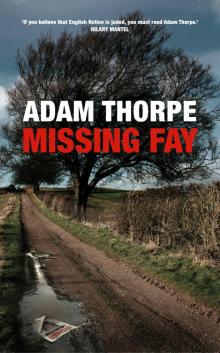 Missing Fay
Missing Fay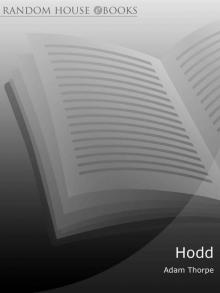 Hodd
Hodd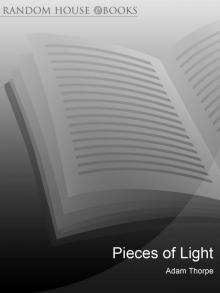 Pieces of Light
Pieces of Light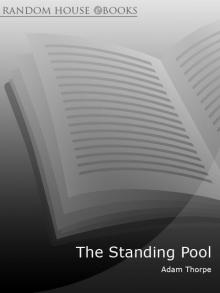 The Standing Pool
The Standing Pool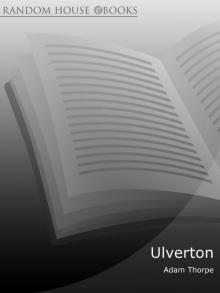 Ulverton
Ulverton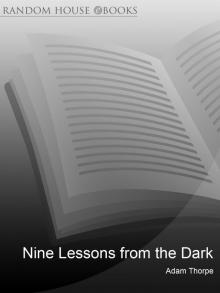 Nine Lessons From the Dark
Nine Lessons From the Dark Flight
Flight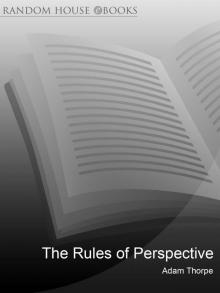 The Rules of Perspective
The Rules of Perspective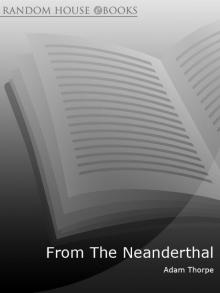 From the Neanderthal
From the Neanderthal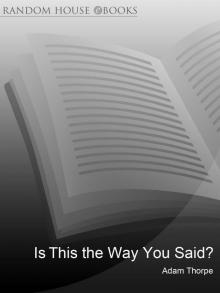 Is This the Way You Said?
Is This the Way You Said?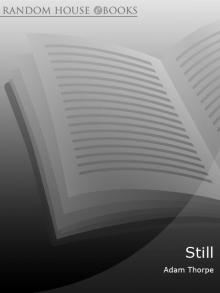 Still
Still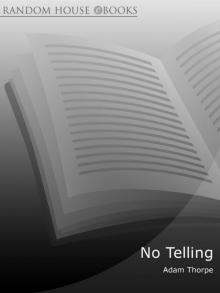 No Telling
No Telling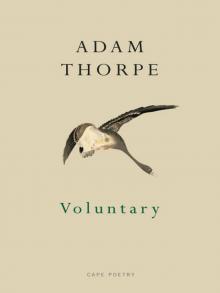 Voluntary
Voluntary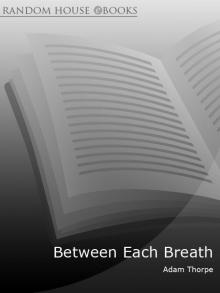 Between Each Breath
Between Each Breath